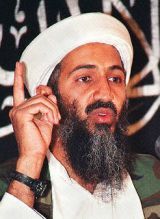Bin Laden call for Darfur jihad clouds UN mission – analysts
April 24, 2006 (LONDON) — For now, there may be more symbol than substance in Osama bin Laden’s call for jihad in Darfur, but that could change if U.N. peacekeepers go to Sudan’s troubled western region, al Qaeda experts said on Monday.
 Most doubted the Saudi-born militant had any direct links with Arab militias involved in the Darfur conflict, but said his appeal, in an audiotape broadcast on Sunday, could inspire violent resistance to any U.N. military mission there.
Most doubted the Saudi-born militant had any direct links with Arab militias involved in the Darfur conflict, but said his appeal, in an audiotape broadcast on Sunday, could inspire violent resistance to any U.N. military mission there.
“I don’t believe it will have an impact until there are U.N. troops in Darfur,” said Kamil al-Tawil, an expert on Islamist groups who writes for London’s al-Hayat newspaper.
“If Darfur becomes a U.N. mandate in spite of the Sudanese government’s opposition, people will flock there. I fear it could be another Iraq,” he said.
The Darfur conflict erupted in 2003 when mostly non-Arab tribes took up arms, accusing Khartoum of neglect.
The government retaliated by arming Arab Janjaweed militia, who unleashed a campaign of murder, rape, arson and plunder that drove more than 2 million villagers into squalid camps in Darfur and in neighbouring Chad. Khartoum denies responsibility.
Bin Laden said the United States and Britain were seeking to dismember Sudan and urged his followers to fight them in Darfur, calling the United Nations an “infidel body” and a U.S. tool.
“I call on the mujahideen and their supporters in Sudan … and the Arabian peninsula to prepare … to wage a long-term war against the Crusaders in western Sudan,” bin Laden said.
Sudan is resisting pressure for U.N. peacekeepers to deploy in Darfur. It has said it fears the presence of international troops would make Darfur a magnet for foreign jihadists.
Bin Laden resided in Sudan in the early 1990s, building his militant network and investing in roads and farming projects for the Islamist government there, until U.S. and Saudi pressure prompted Khartoum to expel him. Afghanistan was his next haven.
After militants blew up the U.S. embassies in Kenya and Tanzania in 1998, the United States bombed al Qaeda camps in Afghanistan and a medicine factory in Khartoum that it said was an al Qaeda chemical weapons venture — a charge Sudan denied.
Bin Laden has rarely spoken publicly about Sudan from hiding, but his audiotape acknowledged rifts with Khartoum.
He criticised President Omar al-Bashir for signing an “unjust agreement” that could let the south secede and for failing to enforce Islamic sharia law across the country.
ECHOES OF SOMALIA?
“He senses Sudan will soon become a failed state that will be dismantled,” said bin Laden biographer Abdel-Bari Atwan.
He said the Qaeda leader had once told him in an interview that he had sent militants to Somalia shortly before U.S. troops joined an ill-fated U.N. military operation there in 1992.
“Now he is preparing his fighters to combat any U.N. troops sent to Darfur to replace African ones there,” Atwan said.
Bin Laden appears to have become an embarrassment for the Sudanese government that once hosted him and a Foreign Ministry spokesman rejected his call for jihad in western Sudan.
“We are not concerned with any mujahideen or any crusade or any war with the international community. We are keen on reaching a peaceful solution to the crisis in Darfur,” he said.
Alani said bin Laden was trying to project Darfur as an issue for the whole Islamic world, not just a local conflict.
“This undermines Khartoum’s authority when they are already under pressure and on the international community’s radar. They feel bin Laden is trying to hijack the Darfur issue,” he said.
Alani said Arab militias, needing legitimacy after being publicly disowned by Khartoum, might respond to bin Laden. Any guerrilla attacks could sow doubts in Western capitals about the wisdom of committing troops to a U.N. operation in Darfur.
Bin Laden, on the run since Washington ousted his Taliban allies in Afghanistan in 2003 after the Sept. 11 attacks, wanted to burnish his pan-Islamic credentials, Alani said.
“He wants to show that al Qaeda has responsibility for every part of the Islamic world, to reinforce the universal nature of the jihad idea and of al Qaeda’s role,” he argued.
Bin Laden bitterly criticised a peace deal signed last year that ended a 20-year war between north and south Sudan.
“Let Bashir and (U.S. President George W.) Bush know that this agreement is not worth the ink it was written with,” he said, accusing the Americans of seeking to steal Sudan’s oil.
The war broadly pitted the Islamist Khartoum government against southern rebels, made up mainly of Christians and followers of traditional African religions. About 2 million people died during the war and 4 million were made homeless.
Some U.N. troops have arrived in southern Sudan, the first of an expected 10,000 peacekeepers to be sent there.
(Reuters)
